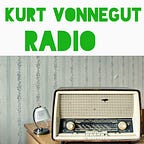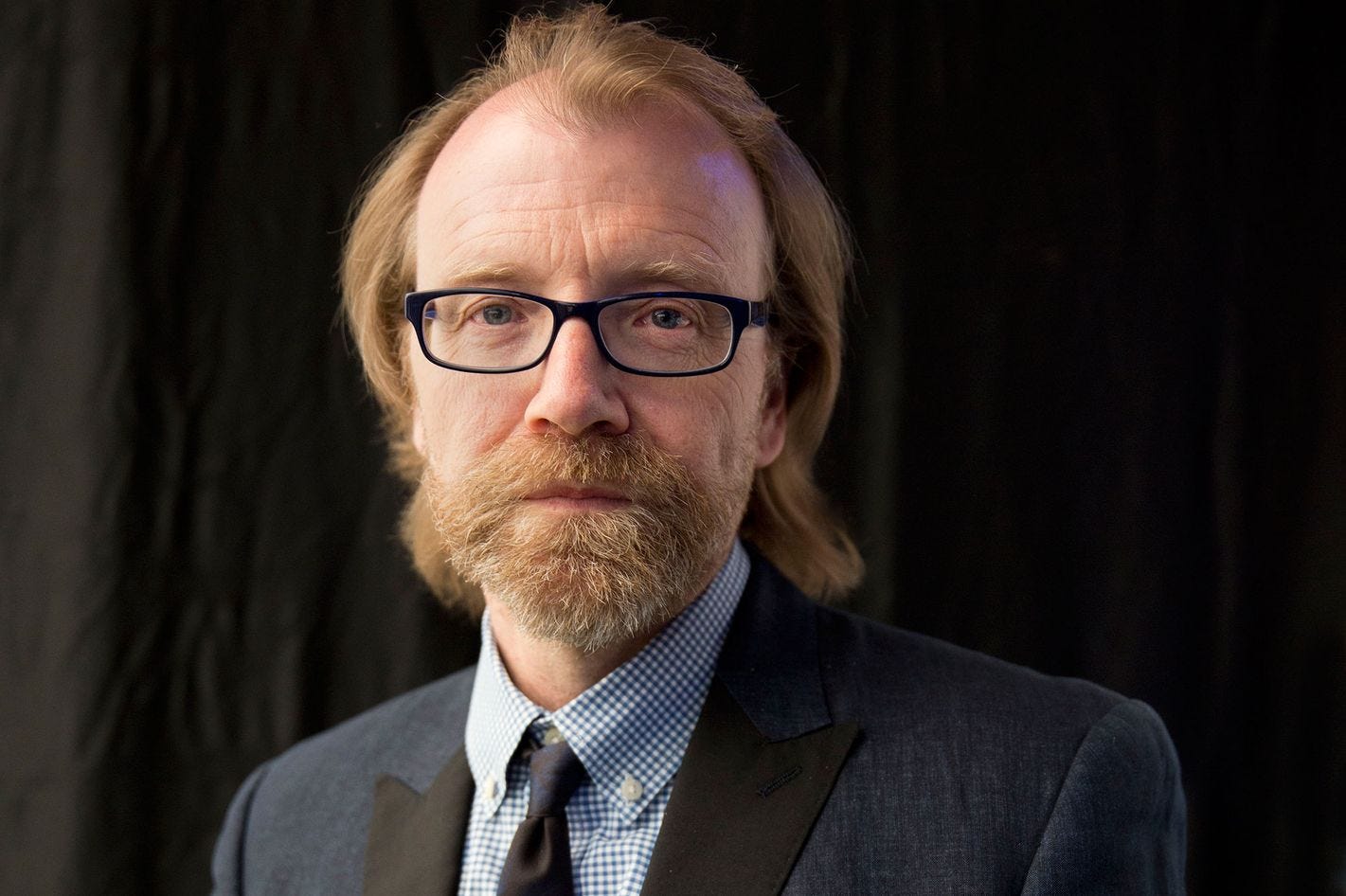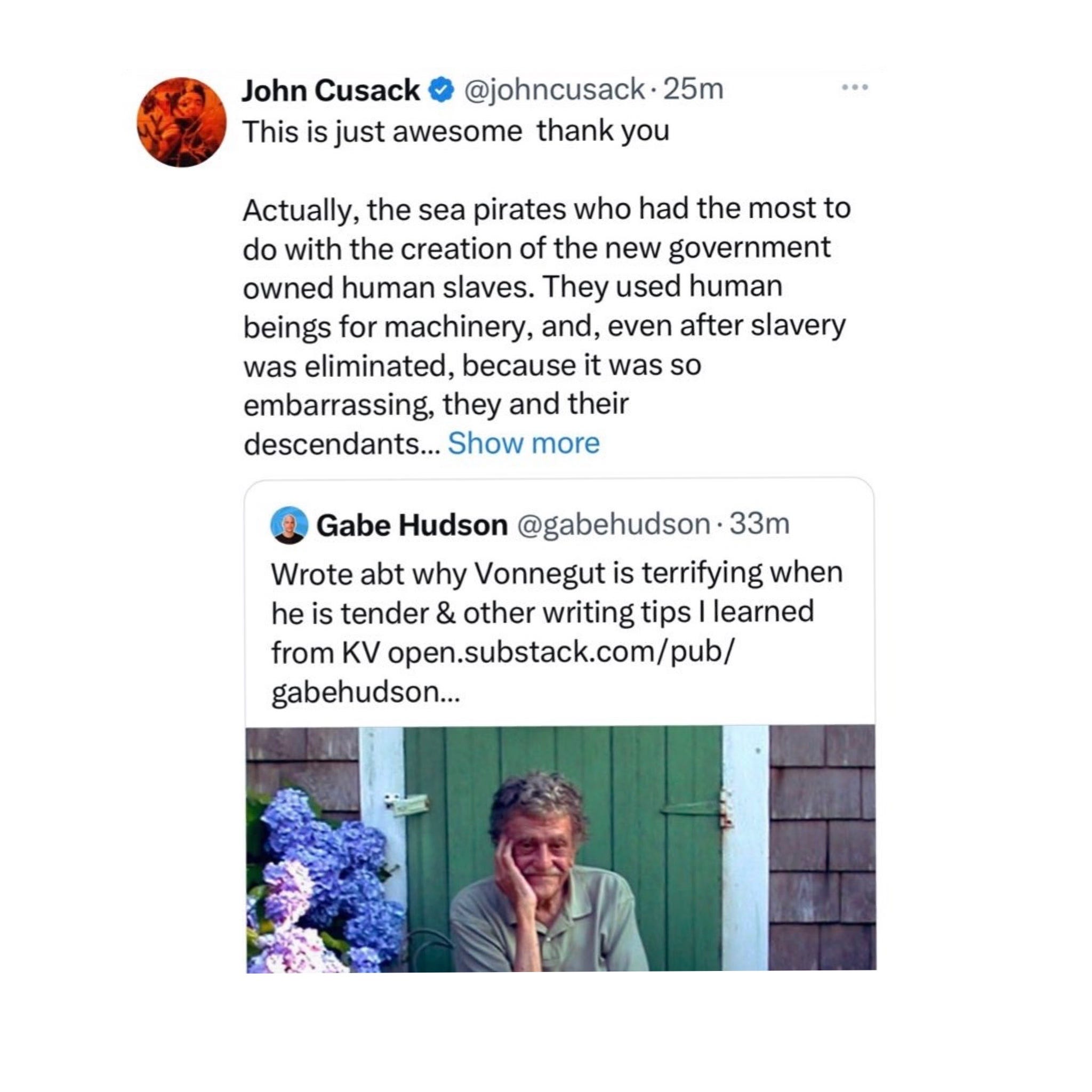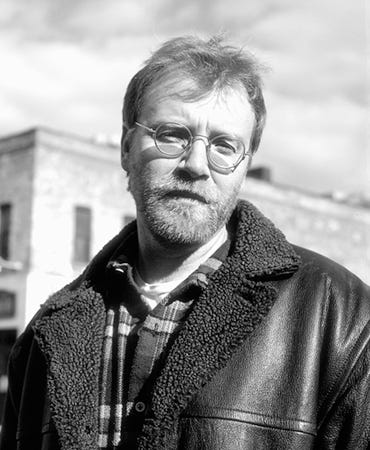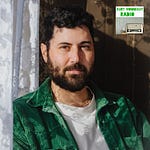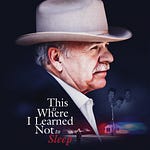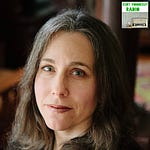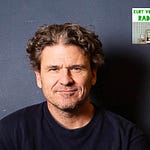Hey People,
This is Gabe Hudson and this is my podcast, Kurt Vonnegut Radio.
And today I want to talk about my writing hero, George Saunders.
George Saunders once gave me some writing advice that changed my life.
So I want to share George’s writing advice with you. Maybe it’ll change your life too?
But before I get into George Saunders and his transformative writing advice, first I want to thank you for all your feedback on our recent Kurt Vonnegut episode. Heck, even fav cultural icon John Cusack tweeted out about my post last week on KV (yes John Cusack reads my Substack, or at least he read one post, but hopefully more, Hi John):
Also my guest this Tues on podcast: Andrew Leland (!!)
This Tues (11/18), look for new episode where I talk to beloved author Andrew Leland, whose new memoir The Country of the Blind: A Memoir at the End of Sight, pubs on Tuesday. The New Yorker ran a fabulous excerpt from Andrew’s memoir this week called, “How to Be Blind.”
Andrew Leland is legally blind, and we have a fun and open-hearted convo about his experiences in blind communities across America, his recent Radiolab piece where he joined a crew of disabled people in a training program for astronauts, the meaning of the word “disability,” how to be an ally to blind people, and what it’s like to write a piece of journalism for The New Yorker.
My George Saunders story about how his writing advice changed my life (and might change yours?)
OK, very quickly for anyone who might not know: George Saunders is a national treasure and author of many award-winning books and dozens of short story masterpieces that routinely appear in The New Yorker. But the term “short story” doesn’t really do what George Saunders does justice: Saunders writes prose miracles that will haunt you to your grave. There’s nothing short about his stories. After you read a George Saunders short story, it will tower over everything else in your mind.
(Also Saunders has a fantastic Substack called Story Club with George Saunders which I highly recommend)
MFA Daze, 1998
I first met Saunders at Brown University in 1998. I was in the MFA program.
And Ben Marcus, who was on faculty at Brown, invited George to campus as a distinguished guest lecturer and instructor for a few days. (If you’ll recall from my Cormac McCarthy post, Ben Marcus was also my first writing teacher at The University of Texas at Austin. Fwiw Ben Marcus is also a virtuosic short story writer and you should read his astonishing collection Leaving the Sea.)
Back to 1998: by this point George’s landmark first book of stories CivilWarLand in Bad Decline had taken the literary world by storm. The word of mouth on this book was a gale force wind. If you read Saunders’ debut collection, you couldn’t help but sing its praises to anyone in earshot. I think this is the mark of a great book, one that causes its readers to break out into song.
For me, personally, Saunders’ first book was a revelation: reading his short stories electroshocked my cold dead heart back to life. In the aftermath of reading that book, it felt amazing to be alive, to be trying to figure out how to become a writer.
George’s weird American spectacular vernacular
And when Saunders burst on the scene, his voice was buck wild.
And emotionally devastating.
And funny af.
And in his own deranged and heartfelt way, Saunders seemed to be arguing that we the people needed to double down on our shared humanity before it was too late.
His characters spoke in this techno futurist everyman slang which possessed the intensity of poetry. Like, for instance, check out how Saunders weds the lyric and the colloquial in the opening of the story, “The Wavemaker Falters”:
Halfway up the mountain it’s the Center for Wayward Nuns, full of sisters and other religious personnel who’ve become doubtful. Once a few of them came down to our facility in stern suits and swam cautiously. The singing from up there never exactly knocks your socks off. It’s very conditional singing, probably because of all the doubt.
George’s stories transform you. You are not the same person you were before you read them. A George Saunders story is like a car wash for your soul. You start off reading a George Saunders short story laughing your ass off and by the time you get to the end you have a lump in your throat and your eyes are all all wet.
Pinching myself, George Freaking Saunders
So in 1998, Saunders visits our MFA program. We’d sent him excerpts of our writing weeks before.
“Hey Gabe,” says George. “Been looking forward to meeting you. They got me set up in an office back there. You ready?”
We’re in Blistein House, which was home to the university’s creative writing program.
Saunders got a goatee, seems young in spirit. Rocking some motorcycle boots. Little swagger. But dude is profoundly kind. I instantly like him. But I also think you’d have to be a real psychopath not to like George.
George drops jewels
Back in his office, we get to work. George breaks out my manuscript and walks me through his edits. Super gracious and smart and charming. I laugh at his jokes. And while I might be a little disappointed he hasn’t started ranting about what a stone-cold genius I am, I am also relieved that he hasn’t called me out for being the fake poser writer and talentless hack I sometimes think I am. He does seem to like my work, even laughs a couple times.
At the end of our conference, I ask him some follow up question to stuff he said during critique. George says, “Look, you’re obviously a brilliant writer. And you’re going to have a career and do impressive stuff. But…” And then he says there’s one concept he wants me to focus on in my writing, and that is:
The heart is in conflict with itself
George tells me that a character’s heart must be in conflict with itself (as soon as he says this lightbulbs go off in my head and I think about how this is true in all his stories). He says that he’s a big believer in Faulkner’s old chestnut “The only thing worth writing about is the human heart in conflict with itself.” Characters must be torn by at least two contradictory impulses. And we, the reader, must feel that character’s struggle.
So there I am, stunned by what Saunders has just told me. The heart is in conflict with itself. My mind is vibrating like a tuning fork. And on a conscious level, I know I’ll have to study this idea some more so I can understand it. But on another level, I already know that George’s words are among the truest things that any human being has ever said to me.
More George magic
So I’m just sitting there, and I pull out my copy of CivilWarLand in Bad Decline and ask him to sign it. He grabs a pen and starts scribbling in the book. And I walk out of that meeting floating on air - not because of the nice stuff he said about my writing, but because he shared so many inspiring ways to rethink my writing, particularly the thing about the heart being in conflict with itself, because the more I thought about it the more it seemed like some sort cosmic key that unlocked a deep truth about the human condition. And when I get home I open the book & read George’s inscription:
Hi Gabe,
It was a great pleasure to meet you and your work.
You hereby owe me one copy of your first book signed.
Keep in touch,
George
Did I cry a little when I read that? Of course. One of my superpowers is I cry easily when something moves me.
“You hereby owe me one copy of your first book signed.”
It is impossible to convey what those words meant to me over the next couple years. How they become a compass for me to navigate my life by. And still are, in that I try show other aspiring writers this same generosity of spirit.
So then what happened?
Fast forward to 2002: “For George,” I write, on the title page of my first book Dear Mr. President. And in this inscription, I remind George that when he signed my copy of CivilWarLand in Bad Decline in Providence, he had written:
“You hereby owe me one copy of your first book signed.”
And so this is my George Saunders story. About how his writing advice and insight on the human heart changed my life.
Because I don’t think there’s a chance in hell I could’ve written my first book, without Saunders explaining to me how a character’s heart needs to be in conflict with itself.
And I’ve tried to pay it forward by teaching this idea about the human heart to my students at Princeton University, Brown University, Yonsei University in Seoul, and most recently, Columbia University. I’d like to believe there’s not a single student I’ve worked with who couldn’t tell you what “the heart is in conflict with itself” means.
Because the heart being in conflict with itself is the secret engine that powers the story.
Thank you, George.
PS. I want to thank everyone who rated and/or wrote a review for this podcast. Here's a fresh review just posted from Ha Ha Hole:
Rate/review Kurt Vonnegut Radio (this is how you help our show live)
More episodes of Kurt Vonnegut Radio:
Follow Kurt Vonnegut Radio on podcast app of your choice
Contact me at gabehudsonpod(at)gmail.com

